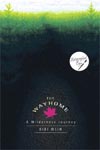| |
|
 |
The Way Home
Creative Non-Fiction by Bibi Wein
Tupelo Press, $16.95
Reviewed by: Amy Unsworth
Book rating: 8 of 10 stars
|

If you like how-to books and are interested in other people's journeys to the wilderness, you may find Bibi Wein's The Way Home an appealing read. Filled with engaging detail of the Adirondacks where Wein escapes her world of work in New York, the book tracks her adjustment to a woodland life and its uncommon demands. Wein's engagement of the physical world goes beyond mere description; she seeks to know and understand her relationship to the natural world. The relationship isn't always an easy one, as her experience of being lost in the forest attests:
I tried not to think about this. . .I was as disturbed by the unfamiliarity of the
terrain as I was by its difficulty. We could be anywhere at all. Above, lost on
the hill, the farmhouse in my mind's eye had nonetheless anchored me. Here,
I felt adrift in a featureless sea.
But to say that The Way Home only explains the woodland journey would be a failure to appreciate the scope of Wein's work. The book also explores the relationship between her and her partner Bob, as well as their relationships to the small community that surrounds them. The portraits of the neighbors and their various reactions to life in the woods are deftly drawn:
Now here they finally were in the flesh, two lean, striking men, more
than six and a half feet tall. Ernie, a land surveyor in his late seventies
was a little bowed but powerful looking, with thick steely hair—an
older version of Jason Robards Jr. but more massive.
Wein portrays alternately the anxiety, frustration, and empathy felt for those whom her life touches while at her woodland home. The most compelling of her stories concerns two neighbors, Duane and Jim. Wein grapples to accept the changes caused by Duane, her neighbor across the creek bank. These struggles are eased by Duane's compassion to Jim, whose dying is one of the central events of the book. Throughout their experiences at the cabin, Jim had been kind and generous to the pair; it was only after his death that the full tragic story of his life was revealed:
I'm not sure if I found it more frightening that, losing the neighbor
I'd known I discovered a stranger had sat at my table—or that I knew
This stranger too. . .If so much of Jim could be so invisible to us, who was
less mysterious?
The book also touches on environmental issues such as logging and the impact of human encroachment, which are examined in a way that encourages thought but avoids being didactic. There are brief descriptions of a scientific nature that are mini-lessons in the ecology of the Adirondack's particular flora and fauna. Those who enjoy literature will also enjoy the selections of quotes from a multitude of sources scattered throughout the book like unexpected wildflowers. The quotes act to anchor the book in the American literary tradition of escaping into the woods to not only discover more about the world which we inhabit, but also to discover how the world allows us to explore and come to a better understanding of ourselves.
Author's Biography:
| |
The Way Home received the Tupelo Literary Fiction/Non-fiction Award and is the author's third book and her first book of creative non-fiction.
|
|
|
 |
 |




